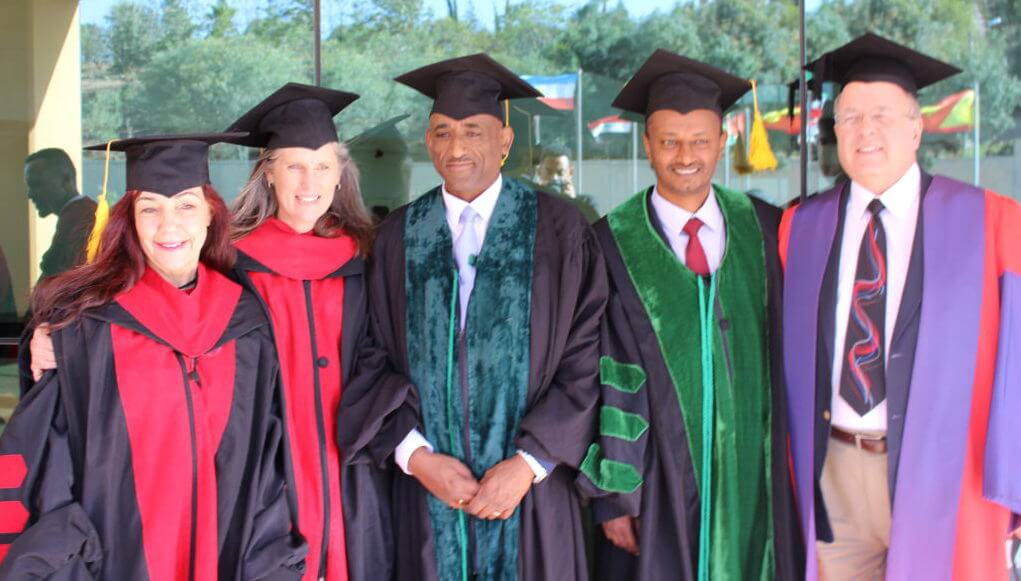Maternal Health Fund pays for the training of surgeons, who become leaders in the treatment of obstetric fistula. But fistula is not the only childbirth-related injury that plagues women who lack access to maternal healthcare. In partnership with Mekelle University, Oregon Health & Science University’s (OHSU) Footsteps to Healing, and Worldwide Fistula Fund, we have initiated a fellowship to introduce the discipline of urogynecology. Only the US and Germany previously offered this specialty, now Ethiopia can train doctors to treat a broader range of childbirth injuries.
Maternal Health Fund sat down with Board Member Dr. Karen Gold, who is on the faculty for the fellowship to learn more about uterine prolapse, a devastating condition that is very prevalent among women in Ethiopia.
Maternal Health Fund (MHF): Thank you for your time today, Dr. Gold. Let’s start with the basics. What is urogynecology?
Dr. Karen Gold: Urogynecology is a relatively new medical sub-specialty that is a crossover between urology and gynecology. Urogynecologists, like me, can do a number of pelvic reconstructive surgeries to treat incontinence, repair obstetric fistula, and other similar procedures.
What is the need for greater training in Ethiopia?
The need for additional training became clear about five years ago. A clinical study conducted in Ethiopia determined that while fistula is prevalent, another childbirth injury – uterine prolapse, or prolapse for short – was much more common.
What is uterine prolapse? Does it have the same devastating effects as obstetric fistula in Ethiopia?
Prolapse is a childbirth injury, like fistula. Unlike fistula, prolapse develops over time and is often the result of a combination of factors including multiple births and difficult manual labor that can do a number on women’s pelvic floor muscles and connective tissue.
When a woman suffers from uterine prolapse, these muscles and connective tissues have weakened to the point where they are unable to keep the uterus in place. In Stage I or II of these conditions, women may feel increased pelvic pressure and discomfort and suffer from incontinence. In later stages, the uterus can protrude from the vagina, making intercourse impossible and significantly decreasing a woman’s quality of life. Like with fistula, once an Ethiopian woman is unable to have children, the likelihood of divorce and abandonment by their husbands rises sharply.
Can uterine prolapse be cured?
There are surgical methods to repair prolapse, but unfortunately, about one-third of these surgeries fail. This is especially true in cases like the ones we see in Ethiopia that are very advanced and have been untreated for many years. Traditional prolapse surgeries would just remove the uterus and do minimal repair, but to be effective this surgery requires more complex reconstructive procedures. The fellowship trains doctors to repair prolapse effectively.
The good news is that once doctors are trained to treat prolapse, the procedure is often easier than repairing some of the more difficult fistula surgeries that these doctors face. At earlier stages, there are even non-surgical treatment options available that women can use and physical therapy that women can do to improve their condition.
What is your role in training doctors to treat prolapse?
I was brought on to be on the faculty for the fellowship along with other urogynecologists from OHSU and Washington University. Because urogynecology is new to Ethiopia, US-certified urogynecologists were recruited to conduct training and classes. The faculty is also responsible for the oral and written exams that physicians must pass to graduate. Our first two fellows graduated earlier this year, Dr. Fekade Ayenachew Medical Director, International Fistula Association (IFA), and Dr. Melaku Abriha from the Hamlin Fistula Center in Mekelle.

What role do you see Maternal Health Fund playing to address the challenge of prolapse in the next five years and beyond?
We hope that many more local doctors become certified urogynecologists and are able to treat prolapse in their country.
We also hope that awareness of prolapse increases in communities across Ethiopia. When women are at the beginning stages of the condition, there is so much more we can do. But, if women do not know what to look for, they might not go into the clinic until their symptoms are severe and injury advanced. By that point, major surgery is the only option available.